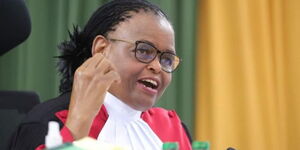Treasury Cabinet Secretary John Mbadi has announced that the government is considering key adjustments to Pay As You Earn (PAYE) and other tax measures to prevent overtaxation of Kenyan pay slips.
Speaking during a session before the Senate on Tuesday, Mbadi disclosed that the government was to make the adjustments in the current Finance Bill that is before the Parliament; however, that was not possible due to several limiting factors.
According to the CS, the government had considered adjustments to the PAYE, however, that was not possible since the Kenya Revenue Authority (KRA) failed to meet its revenue targets.
As a result, the government will make adjustments to the PAYE in the next Finance Bill, a move that will allow Kenyans to have more disposable income. This is the amount of money a person or household has left after paying taxes.
"We have not made major adjustments to taxes, which will disadvantage the taxpayers in terms of reducing their disposable income. We made promises to address this, however, that was not possible. However, where we have reached, we cannot reduce disposable income," Mbadi noted.
Further, the CS announced that the government will reduce the corporate tax from 30 to 28 per cent in the next Finance Bill.
Reducing corporate tax is expected to encourage investment by allowing businesses to retain a larger share of their profits. This could attract both local and foreign companies to expand their operations in Kenya, potentially creating more jobs and stimulating economic growth.
"When we were preparing the Finance Bill, we made some simulations on how to reduce PAYE; however, what stopped us from implementing it with this bill was the failure by KRA to meet its targets. We will consider it in the next Finance Bill alongside the reduction of corporate tax from 30 to 28 per cent," Mbadi added.
However, the government could face short-term revenue losses as businesses pay less in taxes with the reduction of corporate tax. Unless this is offset by higher economic activity or improved tax compliance, there may be less funding available for critical public services such as healthcare, education and infrastructure.
This makes timing and accompanying reforms, such as strengthening revenue collection, crucial to the success of the strategy. Mbadi noted that the government is implementing changes at the KRA but emphasised the need to avoid overloading the system by attempting too many reforms at once.
Meanwhile, the CS noted that Kenyans should expect more pronouncements on the Housing Levy, indicating that the current deductions might be readjusted to ease the pressure on payslips.
Additionally, he hinted that adjustments will also be made to the Road Maintenance Levy (RMF). Currently, Kenyans pay Ksh18 at the pump.
''On Housing Levy, there are discussions on how to make readjustments. Despite it having serious benefits, the individual employees with payslips have complaints about it,'' he added.












